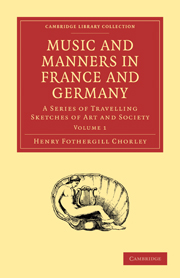Book contents
- Frontmatter
- ADVERTISEMENT
- Contents
- THE GRAND OPERA IN PARIS
- CHAP. I “ESMERALDA”
- CHAP. II THE DROP-CURTAIN
- CHAP. III THE “MYSTERY” OF YOUNG FRANCE.—“ROBERT LE DIABLE”
- CHAP. IV THE ART OPERA — “STRADELLA”
- CHAP. V THE NATIONAL OPERA — “GUILLAUME TELL”
- CHAP. VI DUPREZ
- CHAP. VII THE MASTERPIECE OF FRENCH OPERA—“LES HUGUENOTS”
- THE BRUNSWICK FESTIVAL
CHAP. VI - DUPREZ
Published online by Cambridge University Press: 29 August 2010
- Frontmatter
- ADVERTISEMENT
- Contents
- THE GRAND OPERA IN PARIS
- CHAP. I “ESMERALDA”
- CHAP. II THE DROP-CURTAIN
- CHAP. III THE “MYSTERY” OF YOUNG FRANCE.—“ROBERT LE DIABLE”
- CHAP. IV THE ART OPERA — “STRADELLA”
- CHAP. V THE NATIONAL OPERA — “GUILLAUME TELL”
- CHAP. VI DUPREZ
- CHAP. VII THE MASTERPIECE OF FRENCH OPERA—“LES HUGUENOTS”
- THE BRUNSWICK FESTIVAL
Summary
A gallery of French tenor singers would not be the least edifying chamber in the Pantheon of Art. Few traces would be there found, it is true, of the well-toned and well-cultivated voices, which distinguished the great men of the Italian opera. That they sung through their noses, is as certain as that the Parisian opera songstresses terrified Dr. Burney and Horace Walpole, by their energetic screaming. Many of them, too, were afflicted with that diseased tendency towards a falsetto, which, in our own country, has run the inordinate length of pushing innocent, portly, middle-aged gentlemen into warbling (more oddly to the eye than agreeably to the ear) the sublimest songs of Handel's “Messiah.” In hastily running over the record of the achievements of French singers, ancient and modern, I have been struck by finding so many of them possessed of something more than that staple of our English theatrical vocalists — the “Vox et præterea nihil.” The story of Garat's early life, for instance, is peculiarly agreeable. He had been destined by his father for the profession of an advocate; but, being sent from Bourdeaux to Paris to finish his studies, was seduced from the service of Jurisprudence to that of St. Cecilia, by his intimacy with the Chevalier St. Georges, and by the arrival of Mesdames Todi and Mara — the Sontag and Malibran of their day—who finished the work Nature had begun, and made a further perusal of codes and pandects impossible. He must be a singer! His father, a severe man, discountenanced his son's change of pursuits, as uncompromisingly as any English father in the law could have done.
- Type
- Chapter
- Information
- Music and Manners in France and GermanyA Series of Travelling Sketches of Art and Society, pp. 138 - 166Publisher: Cambridge University PressPrint publication year: 2009First published in: 1841

